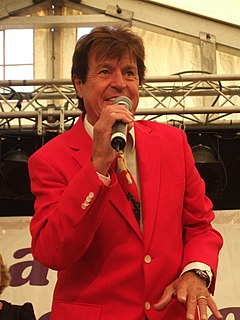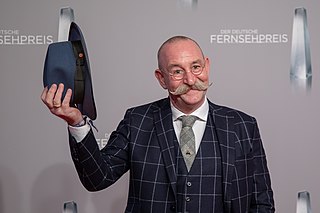
Die Herzogin von Chicago is an operetta in two acts, a prologue, and an epilogue. The music was composed by Hungarian composer Emmerich Kálmán with a libretto by Julius Brammer and Alfred Grünwald. It premiered in Vienna at the Theater an der Wien on April 5, 1928, and played for 372 performances. The work was presented in out-of-town tryouts in Newark, New Jersey and Springfield, Massachusetts by the Shuberts in 1929, but it did not make it to Broadway. The piece was forgotten until 1997, when the Lubo Opera Company performed it in concert in New York, after which Light Opera Works of Illinois performed the work in 1998 in a fully staged version with a new translation by Philip Kraus and Gregory Opelka. In 1999, Richard Bonynge made a recording of the work, which revived international interest in it.

Harald JuhnkeGerman pronunciation: ['juːnkə], real name Harry Heinz Herbert Juhnke, was a well-known German actor, comedian and entertainer.
Paul Godwin (1902–1982) was a violinist and the leader of a popular German dance orchestra in the 1920s and 30s.
Lichter is a German surname meaning somebody who castrates animals The Jewish surname Lichter means "lights".

Ireen Sheer is a German-British pop singer. She had a top five hit on the German singles chart with "Goodbye Mama" in 1973. She went on to finish fourth at the Eurovision Song Contest 1974 representing Luxembourg, sixth at the Eurovision Song Contest 1978 representing Germany, and 13th for Luxembourg in 1985.

Lena Valaitis is a Lithuanian–German schlager singer who had her greatest success during the 1970s and 1980s. She finished second at the 1981 Eurovision Song Contest.
Nicolaus A. Huber is a German composer.

Katja Ebstein is a German singer. She was born in Girlachsdorf. She achieved success with songs such as Theater and Es war einmal ein Jäger. She was married to Christian Bruhn, who wrote many of her songs. She represented Germany at the Eurovision Song Contest three times, in 1970, 1971, and 1980. Her best performance was in 1980 when she gained second place with the entry Theater. As noted by John Kennedy O'Connor in his book The Eurovision Song Contest – The Official History, Ebstein is the most successful performer to have taken part in the contest without ever winning. She is the only singer to appear in the top three on three occasions.
Die Flippers were a German Schlager group formed in 1964. They were one of the most successful Schlager groups of all time, and have been constantly recording and releasing new music since their self-titled debut album was released in 1970. They have released 45 albums, 5 of which have gone platinum, 24 gold. They have won a Goldene Stimmgabel in 1988, 1991, 1994, 1995, 1996, 1998, 1999, 2000, 2002, 2003 and 2004.

Mary Roos is a German singer and actress.

Gebhardt Georg Arendt was a German actor, cabaret artist and comedian. He appeared in 104 films between 1956 and 2002. He was born in Danzig, Free City of Danzig and died in Munich, Germany, aged 88 from Alzheimer's disease.

Freddy Breck was a German schlager singer, composer, record producer, and news anchor.

Gustav Knuth was a German film actor. He appeared in 128 films between 1935 and 1982 and starred in the TV series Alle meine Tiere. He was married to the actress Elisabeth Lennartz.
Ulla Wiesner is a German singer.
Harry Winter, born Horst Winter, was a German-Austrian singer, musician and band director.

Doris Inge Wegener, better known by her stage name Manuela, was a German singer.
Rudi Schuricke was a popular German singer and actor. In the 1930s he was Second Tenor with the Kardosch Singers, a popular vocal ensemble of the time. When the group dissolved in 1935, Schuricke joined the Spree Revellers and later proceeded to found his own vocal group, the Schuricke Terzett. He also appeared as a solo singer with many popular orchestras of the 1930s and 40s. His 1949 recording of "Capri-Fischer" was a "smash hit" in Germany. Even as late as the mid-1950s, he was still a successful musical artist. In 1954 alone, his song "Moulin Rouge" was the 74th most purchased single on the German year-end chart and another of his songs "Das Märchen unserer Liebe" appeared on the German Top50 chart. The advent of the rock 'n' roll age, however, soon made his music out-dated.

Jonny Hill is an Austrian singer. He is best known for the songs “Ruf Teddybär eins vier”, “Der alte Mann” and “30 Tonnen Kerosin”.

Wilhelm Horst Lichter is a German cook, television cook, cookbook author and moderator. He also occasionally appears on stage as an entertainer.
"Connie" Edmund Kötscher was a German light music composer and bandleader.












